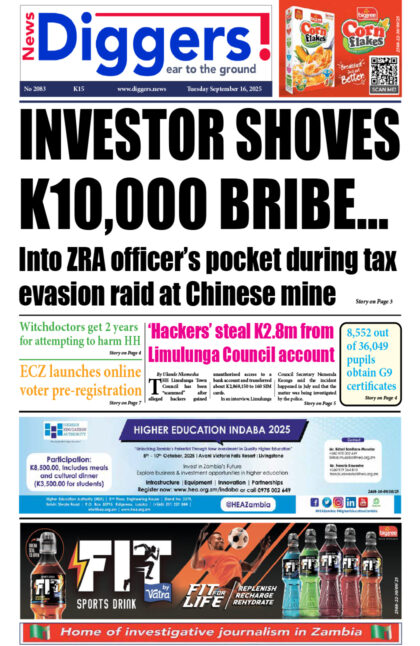Civil Society for Poverty Reduction (CSPR) executive director Patric Nshindano has advised the government to take keen interest in the oil exploration exercise taking place in Northern Province of Zambia and further demand shares in the British company that is looking for the commodity.
In an interview with News Diggers! Nshindano also urged the government to strictly scrutinise foreign investors, especially when negative reports about a company’s reputation begin to emerge.
“We have heard a lot of emphasis on bringing foreign direct investment in this country as a way to develop. But we need to start looking inwardly at how we can also be able to grow our own domestic private sector in all sectors, be it mining, oil exploration and so on. We need to look at the kind of investors we are bringing, that is important,” Nshindano said.
“On the part of Tullow Oil company, one of the things that needs to be done is to ensure that oil exploration is as transparent as possible. We need to ensure that even when the discovery [of oil] is done, it should not be left to Tullow oil alone, we need to ensure that government has a huge stake in that in terms of shareholding and it should not be a minority shareholder like we have had with ZCCM-IH.”
He said government shareholding in foreign companies would foster transparency.
“Giving a bigger shareholding to government will ensure accountability and in terms of profit, even if the company does not declare profit at least we are able to get revenue one way or the another through sales that are going to be generated in a profit making position. That way, you will not only get dividends but it will also be part of sharing profit, including taxation. So what needs to be done is to avoid mistakes we have made in the past as government where we leave national asserts solely in the hands of the private hands.”
Meanwhile Nshindano said government should have opened up the boarders much earlier to allow farmers sale their maize at profitable prices across the continent.
“The issue of the maize floor price is a really complicated one and it’s not just about pricing alone. This is something that we as CSPR have indicated that we need to look at agriculture holistically for you to understand the context within which the battle of the floor price is applied. Firstly one of the things is that government has been very active on the market with FRA and this has always influenced the floor price. Of course they did indicate that they would not dictate the floor pricing this time around but we all know that once FRA sets the price, that price tends to affect the private sector’s pricing,” observed Nshindano.
“But ideally, the market is able to set it’s own price and not what FRA does. But you also know that there are a lot of distortions within the market through the subsidy programme both on the production and consumption side through the FISP programme as well as the FRA programme which also brings in distortion. What government should have done this time, since we have surplus maize as a country, was to open up the boarders quickly so that people could sell their maize out side and make profit for their maize. That way they could not have found themselves in this situation where the price of maize is so low.”
























